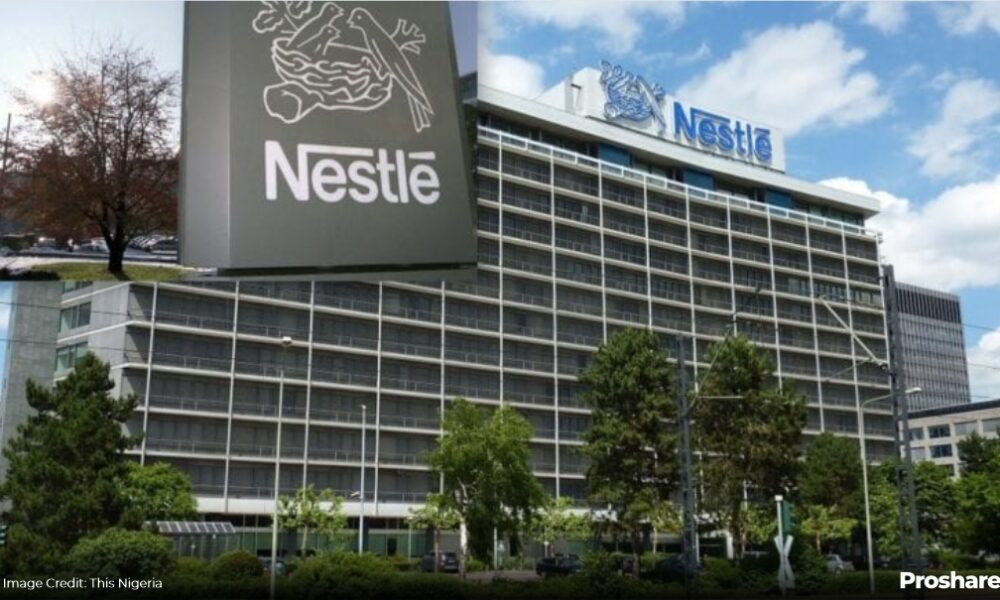By Godwin Anyebe
In an era where access to clean water is increasingly recognized as a fundamental human right, Nestlé’s approach to water management and sustainability reflects a critical commitment to both environmental stewardship and social responsibility. The company’s water project, known for its multifaceted strategy, embodies an effort to address the global water crisis while prioritizing humanity’s needs.
Nestlé’s water project is grounded in the belief that the world’s water resources must be managed with an eye toward sustainability and equity. This vision is reflected in their various initiatives aimed at ensuring that clean water is available not just for today, but for future generations.
The core of Nestlé’s strategy involves a balance between commercial operations and environmental conservation. By leveraging advanced technology and innovative practices, the company seeks to minimize its water footprint while enhancing the efficiency of its water use in production processes.
Local Impact and Community Engagement
One of the standout features of Nestlé’s water project is its emphasis on local impact. The company collaborates with communities around the world to improve access to clean water. This includes supporting local water infrastructure projects, such as building wells and water purification systems in underserved areas. Through partnerships with non-governmental organizations (NGOs) and local authorities, Nestlé ensures that their initiatives are tailored to the specific needs of each community.
For instance, to commemorate World Water Day 2024 with the theme “Water for Peace,” Nestlé Nigeria, the Ogun State Government and the Ogun-Osun Water Basin Authority organised an event to raise awareness about the importance of water conservation and responsible water management practices.
The event which took place in Abeokuta, highlighted the role of Public-Private Partnership, (PPP) to spur collective action towards a water-secure future. Nestlé Nigeria has long been committed to sustainable water practices and has implemented various initiatives to reduce water consumption across its operations.
Over the last three years, the company has achieved reductions of 48,898 m3 in water usage, demonstrating its dedication to sustainable water stewardship. “We are delighted to collaborate with the Ogun State Government to champion sustainable water practices on World Water Day 2024,” said Mr. Wassim Elhusseini, CEO of Nestlé Nigeria.
“Water is a precious resource, and it is our collective responsibility to protect and conserve it. Through this collaboration, we aim to make a positive impact on the environment and the communities we serve.” The head, Corporate Communications, Public Affairs and Sustainability at Nestlé Nigeria, Victoria Uwadoka said, “We are delighted to collaborate with the Ogun State Government to champion sustainable water practices on World Water Day 2024. Nestlé is committed to taking action to protect water resources for today and for future generations.
In addition, in regions where water scarcity is a pressing issue, Nestlé’s projects often focus on enhancing water accessibility and quality. The company’s efforts extend beyond mere donations; they involve working closely with communities to implement sustainable practices and educate local populations about water conservation.
Innovations in Water Efficiency
Nestlé is committed to continuous improvement in water efficiency within its operations. The company has adopted cutting-edge technologies to reduce water consumption in its manufacturing processes. These innovations include advanced water recycling systems and efficient water management practices that significantly lower the amount of water used in production.
By prioritizing water recycling and reuse, Nestlé not only reduces its environmental impact but also sets an industry standard for water stewardship. The company’s commitment to reducing its water usage aligns with global sustainability goals and underscores the importance of corporate responsibility in addressing environmental challenges.
A Commitment to Transparency and Accountability
Transparency and accountability are cornerstones of Nestlé’s water project. The company regularly publishes reports on its water usage and sustainability efforts, providing stakeholders with insights into its progress and challenges. This openness helps build trust and demonstrates Nestlé’s dedication to making a positive impact on both the environment and the communities it serves.
Nestlé’s approach to water management also involves engaging with external experts and stakeholders to review and refine its practices. By incorporating feedback from various perspectives, the company ensures that its strategies are both effective and responsive to evolving needs.
Addressing Criticisms and Challenges
Despite its efforts, Nestlé’s water project has faced scrutiny and criticism, particularly regarding the commercialization of water resources and the impact on local communities. Critics argue that the extraction of water for commercial purposes can lead to depletion of local water supplies and affect community access.
In response to these concerns, Nestlé has made strides in addressing criticisms by reassessing its water sourcing practices and enhancing its community engagement efforts. The company is working to balance its commercial activities with a strong focus on sustainability and social responsibility, aiming to address the concerns of stakeholders while continuing its commitment to water stewardship.
Looking Ahead
Nestlé’s water project represents a significant endeavor to align business practices with the imperative of sustainable and equitable water management. By prioritizing humanity’s needs, the company is taking a proactive role in addressing the global water crisis and setting an example for other corporations.
As the world continues to grapple with water scarcity and environmental challenges, Nestlé’s approach serves as a model for how businesses can contribute to solving these pressing issues. With ongoing innovation, community engagement, and a commitment to transparency, Nestlé is working to ensure that clean water remains a resource available to all, now and in the future.
Experts Views
Speaking to Consumers Assembly on this development, a renowned public affairs commentator and environmental policy expert, Dr. Williams Kamale acknowledges the positive aspects of Nestlé’s water project, particularly the company’s dedication to integrating sustainability into its operations. “Nestlé’s approach to water management showcases a significant shift toward more responsible corporate practices,” he notes. “The implementation of advanced water recycling technologies and the focus on reducing water consumption in production are commendable steps in the right direction.”
He also highlights the project’s emphasis on local community engagement. “The company’s efforts to improve access to clean water through partnerships with NGOs and local authorities reflect a meaningful commitment to addressing water scarcity in underserved areas. By supporting infrastructure projects like wells and purification systems, Nestlé is addressing a critical need in many regions.”
Dr. Kamale praises Nestlé’s commitment to transparency. “Regular reporting on water usage and sustainability efforts is crucial for maintaining public trust. Nestlé’s openness in sharing its progress and challenges sets a standard for accountability in the industry.” He believes that this transparency is essential for holding corporations accountable and ensuring that their practices align with their stated goals.
Despite these positive aspects, Dr. Kamale is not blind to the criticisms that have emerged regarding Nestlé’s water project. “It is essential to address the concerns about the commercialization of water resources and the impact on local communities,” he says. “Critics argue that water extraction for commercial purposes can deplete local supplies and hinder community access.”
He suggests that Nestlé’s response to these criticisms—such as reassessing water sourcing practices and enhancing community engagement—should be closely examined. “While Nestlé has made efforts to address these issues, it is crucial for the company to demonstrate a genuine commitment to balancing commercial interests with the needs of local communities.”
Looking to the future, Dr. Kamale emphasizes the importance of ongoing improvement and collaboration. “Nestlé’s water project is a step in the right direction, but it must continue to evolve and adapt. Addressing water scarcity and environmental challenges requires not only innovative solutions but also a collaborative approach with stakeholders at all levels.”
He advocates for a broader dialogue involving governments, NGOs, and local communities to ensure that water management practices are both effective and equitable. “Ultimately, the goal should be to create a model of water stewardship that benefits all stakeholders and sets a precedent for other corporations to follow.”
In Dr. Kamale’s view, Nestlé’s water project represents a significant effort to integrate sustainability with corporate responsibility. While the project demonstrates a commendable commitment to improving water access and reducing environmental impact, it also faces challenges that must be addressed to fully align with the principles of equity and environmental stewardship. As Nestlé continues its efforts, Dr. Kamale encourages ongoing transparency, stakeholder engagement, and adaptability to ensure that the project genuinely puts humanity first.
His perspective highlights the complexity of balancing commercial interests with the imperative of sustainable and equitable water management. Nestlé’s approach, while promising, must navigate these challenges thoughtfully to achieve lasting positive outcomes for both people and the planet.
Also speaking to Consumers Assembly on this issue, the immediate past President of the Committee for the Defense of Human Rights (CDHR), Comrade Ade Ikweson, through the prism of human rights, begins by emphasizing that access to clean and safe water is a fundamental human right recognized by international frameworks, including the United Nations General Assembly’s resolution on the human right to water. “Water is not merely a commodity but a basic necessity for life and dignity,” he asserts. “Any water project must, therefore, prioritize human rights and ensure that it aligns with the principles of fairness and equity.”
In evaluating Nestlé Nigeria’s water project, Comrade Ikweson acknowledges the company’s efforts to address water scarcity and improve access to clean water in various communities. “It is commendable that Nestlé Nigeria is investing in water infrastructure and partnering with local organizations to support water access,” he notes. “Such initiatives can have a positive impact on public health and community well-being.”
However, he also stresses the importance of scrutinizing these efforts from a human rights perspective. “While the project aims to provide clean water, it is crucial to examine how these efforts affect local communities and whether they uphold the rights of all individuals, particularly the most vulnerable.”
One of the primary concerns raised by Comrade Ikweson is the commercialization of water resources. “The extraction and commercial sale of water must be carefully managed to avoid adverse impacts on local communities,” he argues. “In some cases, large-scale water extraction by corporations can lead to reduced access for local residents, exacerbating existing inequalities.”
He emphasizes that any commercial water project should not undermine the rights of local populations. “Nestlé Nigeria must ensure that its water extraction practices do not deplete local resources or compromise community access. The project should be designed with mechanisms to protect and prioritize the rights of individuals over corporate interests.”
Comrade Ikweson highlights the importance of meaningful community engagement in ensuring that water projects respect human rights. “Engaging with local communities in decision-making processes is vital for respecting their rights and addressing their needs,” he asserts. “Communities should have a say in how water resources are managed and benefit from the projects in a fair and equitable manner.”
Transparency is also crucial, according to Comrade Ikweson. “Nestlé Nigeria must be transparent about its water sourcing and distribution practices. Clear communication and accountability are essential for building trust and ensuring that the project aligns with human rights principles.”
Conclusion
Nestlé’s water project embodies a dedication to putting humanity first by integrating sustainable practices with a strong focus on community well-being. While challenges remain, the company’s efforts highlight the potential for positive change when corporate responsibility and environmental stewardship are pursued in tandem.









